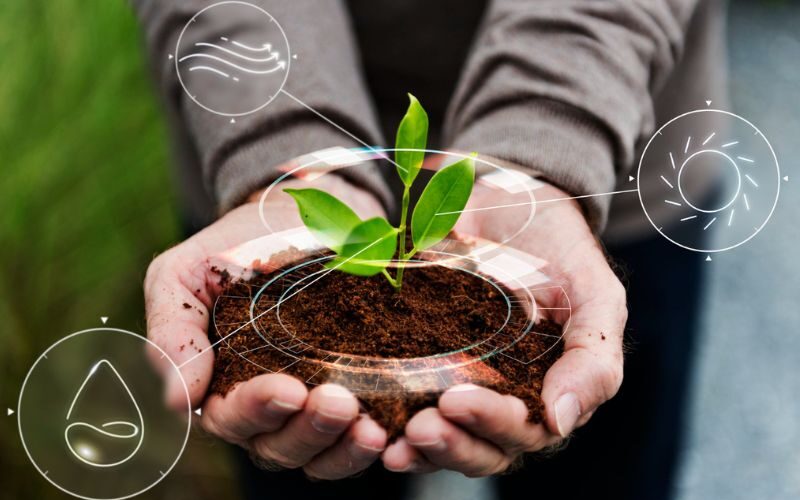In the fast-paced world of gardening, enthusiasts frequently follow the path of organic solutions in their pursuit of colorful, healthy plants. Organic plant fertilizers and garden accessories are in high demand as environmental consciousness and sustainability grow. Whether you are an experienced gardener or a novice, the first step to creating a more lush environment is learning about the benefits of organic fertilizers and how garden accessories may support indoor plants.
Organic Plant Fertilizer
For gardeners looking to provide their plants with healthy food, organic plant fertilizers are a gift from the natural world. Organic fertilizers use natural elements to support healthy growth, unlike synthetic fertilizers which may contain harsh chemicals harmful to plants and the environment. These organic wonders—which range from compost and manure to seaweed and bone meal—enrich the soil with vital minerals that promote strong root development and lush foliage.
For those who enjoy indoor plants, selecting the right fertilizer becomes even more important. For indoor plants, organic fertilizers with specific nutritional balances provide ideal growth without putting plants at risk of chemical buildup or nutrient imbalances. These specialist mixes address the particular requirements of potted plants and offer a mild yet efficient remedy for successful indoor gardening.
Organic Fertilizer for Indoor Plants
The capacity of organic fertilizers to gradually improve soil fertility and structure is one of their main benefits for indoor plants. Organic fertilizers improve the soil microbiome and create a vibrant environment that supports the growth of beneficial bacteria, in contrast to their synthetic equivalents, which over time may weaken the health of the soil. In addition to encouraging plant growth, this all-encompassing strategy also fosters the resilience and long-term health of the soil.
Garden Fertilizers
There are many options available when it comes to garden fertilizers, and each one has advantages tailored to the demands of different plants. Garden fertilizers are available in a variety of formats to meet varied gardening needs and preferences, from slow-release granules to liquid concentrates. Gardeners who are concerned about the environment tend to favor organic choices due to their eco-friendly composition and efficient yet delicate nutrition delivery.
Garden Accessories
When it comes to maintaining indoor plants, garden accessories are just as important as organic plant fertilizers. These accessories, which range from plant stands and artistic pots to pruners and watering cans, not only fulfill functional needs but also enhance the visual attractiveness of interior areas. Purchasing high-quality garden accessories improves indoor plant displays’ aesthetic appeal in addition to making gardening more enjoyable.
For example, watering cans provide a precise and gentle method of hydrating indoor plants while reducing the possibility of overwatering or waterlogging. Choosing environmentally friendly materials to care for indoor vegetation, like stainless steel or recycled plastic, is in line with sustainable gardening methods and lessens the impact on the environment.

Shears and pruners are essential equipment for caring for indoor plants since they enable gardeners to precisely and carefully clip and shape leaves. Frequent pruning ensures a harmonious balance between plants and their interior environment by encouraging healthy growth and assisting in the regulation of plant size and shape.
Indoor plant displays are given a stylish and individual touch by decorative pots and planters, which turn plain spaces into vivid green havens. The selection of pots and planters, which range from modern minimalist styles to whimsical and vibrant possibilities, represents the unique interests and preferences of gardeners and gives indoor gardening projects a personalized touch.
Climbing plants can reach new heights with the support of plant stands and trellises, which can offer vertical flair to interior areas. These useful extras not only maximize the use of available space but also produce visually arresting displays that transform plain walls and corners into lush exhibits of floral beauty.
FAQ’s (Frequently Asked Questions)
Q. What are organic plant fertilizers?
A. Natural substances derived from living organisms or their byproducts to nourish plants without synthetic chemicals.
Q: Why choose organic plant fertilizers?
A: They promote soil health, are eco-friendly, safe for pets and humans, and enhance long-term plant growth.
Q: Examples of organic plant fertilizers?
A: Compost, manure, bone meal, seaweed extract, fish emulsion, and worm castings.
Q: How to use organic fertilizers effectively?
A: Follow package instructions or general guidelines for your plants, usually mixing into soil or as a top dressing.
Q: Can organic fertilizers be used indoors?
A: Yes, they’re suitable for indoor plants, providing gentle and sustainable nourishment.
Q: What are popular garden accessories for indoor plants?
A: Decorative plant pots, watering cans, misters, humidity trays, and grow lights.
Q: How to maintain lush indoor greenery with organics?
A: Regularly feed plants, maintain watering schedules, ensure proper lighting, monitor humidity, and rotate/prune plants.
Q: Are organic fertilizers safe for edible plants?
A: Yes, they’re safe for edible plants, offering natural nutrition without harmful chemicals.
Q: Can I make organic fertilizers at home?
A: Yes, composting kitchen scraps, brewing compost teas, or making worm castings are common DIY methods.
Q: Do organic fertilizers smell bad?
A: Some may have a mild odor due to their natural components, but it’s usually not overwhelming and dissipates quickly.
Conclusion
The foundation of any successful indoor gardening project is organic plant nutrients and garden accessories. Gardeners may create healthy green spaces that benefit the mind, body, and soul by utilizing the abundance of nature and incorporating decorative and useful items into indoor plant displays. The first step towards a greener, Adhunik Amrit is more sustainable future is adopting organic gardening practices and making quality garden accessory purchases, whether you’re growing a little herb garden or a lush jungle sanctuary.





 Locate Us
Locate Us